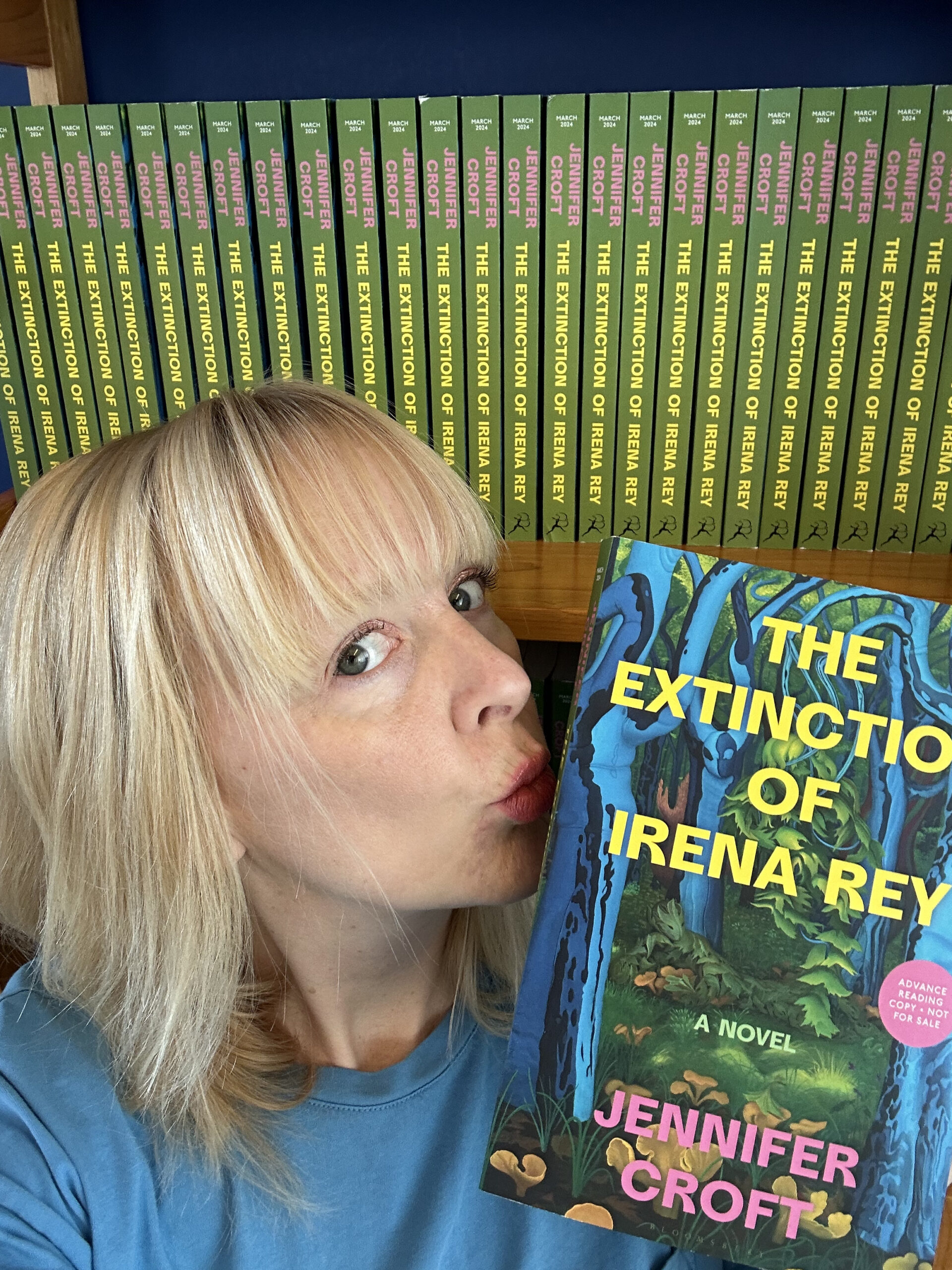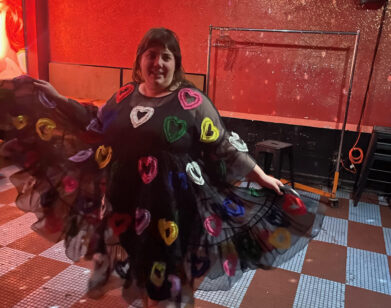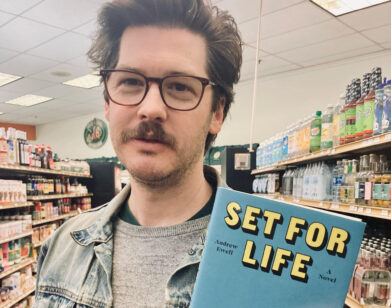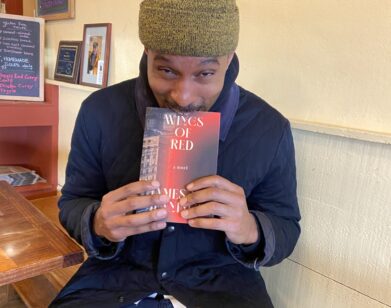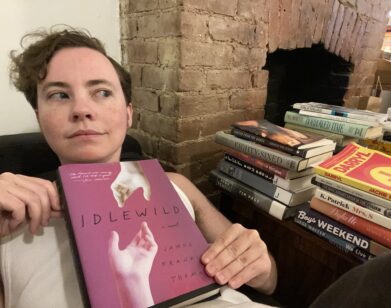OPEN BOOK
Author Jennifer Croft on the Power of Translation and the Joy of Paperbacks
This is OPEN BOOK, a monthly column in which we ask debut authors about their reading and writing habits. Last month, we featured Andrew Ewell, the author of Set For Life. For this month, we spoke with Jennifer Croft, winner of the Man Booker Prize for translation and author of The Extinction of Irena Rey, out today, almost otherworldly novel set in Europe’s last remaining original forest. When eight translators arrive at the Polish woodland home of world-renowned author Irena Rey to translate her magnum opus, they are faced with her mysterious disappearance and are subsequently thrown into a parallel world of botanical secrets, forced to reckon with their own rivalries and obsessions. Just before the book’s release, Croft, who was awarded the 2018 International Man Booker Prize for her translation of Olga Tokarczuk’s Flights, answered our author questionnaire, sounding off on her love of writer’s residencies and the “supple and obliging” beauty of a good paperback.
———
Where do you like to write?
I think artists who can make art anywhere are better people than people like me, but I do like certain luxuries when I am working: I love having a view and/or access to nature, I love not being interrupted, I love lounging around on fancy furniture I didn’t have to pay for myself. In other words: writing residencies. Aside from all that, I like to write in bed.
When do you like to write?
I like to start writing just before dawn and then continue for as long as I can, until I have to interact with other human beings. That almost always breaks the spell.
What’s the first thing you did after you turned in a draft of your book?
I don’t remember, but since I had two infants by the time I turned in a new draft to my editor, my guess is I either fed them or changed their diapers, or both.
The Extinction of Irena Ray is set in a primeval Polish forest on the border of Belarus. What inspired this setting?
In 2017, when the book is set, the Polish government began logging Europe’s last remaining original forest, the only habitat left in the world for all kinds of species of plants, animals, and fungi. I have been to the Białowieża Forest several times, and I have never felt anywhere else the way I feel there. Perhaps as a result of its density and biodiversity, it’s an extraordinarily powerful place, one I hope is allowed to continue existing.
Tell us about three to five books you read while writing your own, and why?
Merlin Sheldrake’s gorgeous Entangled Life: How Fungi Make Our Worlds, Change Our Minds & Shape Our Futures was a major source of inspiration, as was an album titled The Suspended Harp of Babel by Vox Clamantis (an Estonian choir) and Jaan-Eik Tulve (who directed the choir), which I must have listened to ten thousand times over the course of creating The Extinction of Irena Rey. I realize you didn’t ask about music, but The Suspended Harp of Babel influenced the world of my novel more than just about anything else. I also read some excellent works of non-fiction on the Białowieża Forest that have not yet been translated into English, like Anna Kamińska’s Białowieża szeptem: Historie z Puszczy Białowieskiej.
Tell us about a formative early reading experience.
Before I ever traveled internationally, my experience with forests was limited to northeastern Oklahoma, where I grew up. But that experience was also one of wonderment and magic, and fear, of course, and thrill. One of the traditional stories of the forested camp where I spent part of every summer was Jane Shaw Ward’s Tajar Tales, about a character who was “something like a tiger, and something like a jaguar, and something like a badger,” and who was always getting into trouble. Children had to be careful not to seek him out—although we were allowed to write him letters, which we deposited into the hollow of a particular tree—because “if you see him once, you would forget what he looked like, but if you should see him twice, you would forget to forget what he looked like, and that would be quite fatal.” I was always amused by that way of putting it, “forget to forget,” and I loved Tajar’s friends, like Madam Witch, who lived in a magic tree, and the Range Ranger, who “ranges the ranges in that region.” I think Ward’s Tajar Tales must have influenced me to include, in The Extinction of Irena Rey, a character based on the ancient Slavic mythological figure Leshy, an embodiment of the forest and a trickster himself. His shapeshifting also mirrors the action of translation, which is what all the other characters in the book are up to: transforming and being transformed.
The last book you loved, and why?
Little Owl’s Night by Divya Srinivasan, because my son loves it, and I love the way he watches as I read.
The last book that disappointed you, and why?
I’m almost never disappointed by books, even when they’re not that great. I just love the experience of being in a book.
As an award-winning translator yourself, what inspired you to write a novel about translation?
I wanted to show how much power translators have, as opposed to just talking about it. The translator is the person who writes every word of the book you end up reading, and their identity should always be known.
What is one novel you wish you could translate?
Pornografia by Witold Gombrowicz.
Hardcover or paperback? Why?
I love carrying around a paperback, just knowing it’s there in my bag if I need it. And paperbacks almost seem to love being carried around, they’re so supple and obliging, especially UK paperbacks.
Now that I have toddlers, I will say I also love board books, which no other adult in the world seems to care about, but they’re so great! They last so much longer! Whereas hardcovers are the worst of all worlds.
A book you think should be in the canon, but isn’t:
I did a PhD in Literature at Northwestern but have completely lost track of what is canonical since then. And what is canonical to whom? When? Books’ popularity fluctuates all the time, I’m not sure I believe in a canon.
A book you think shouldn’t be in the canon, but is:
There are lots of books I was told to read when I was younger that felt so misogynistic to me I couldn’t really read them; let’s just say they’re not in my personal non-canon canon.
How do you arrange your bookshelf?
I’ve never arranged my bookshelf, it arranges itself.
What’s your favorite bookstore?
My favorite bookstore (and one of my favorite places in the world) is Eterna Cadencia in the Palermo neighborhood of Buenos Aires. It’s on a beautiful, leafy street, in an old building with a narrow internal courtyard that has been converted into a café that holds readings and other events. It has long rows of new Argentine books and translated books, some of which are published by Eterna Cadencia, an excellent independent house. I can’t imagine a lovelier, more peaceful, yet more exciting space.
What do you look for in a reading experience?
Humor, sensitivity to language, empathy for the characters. Ambition, or restlessness, or curiosity.

